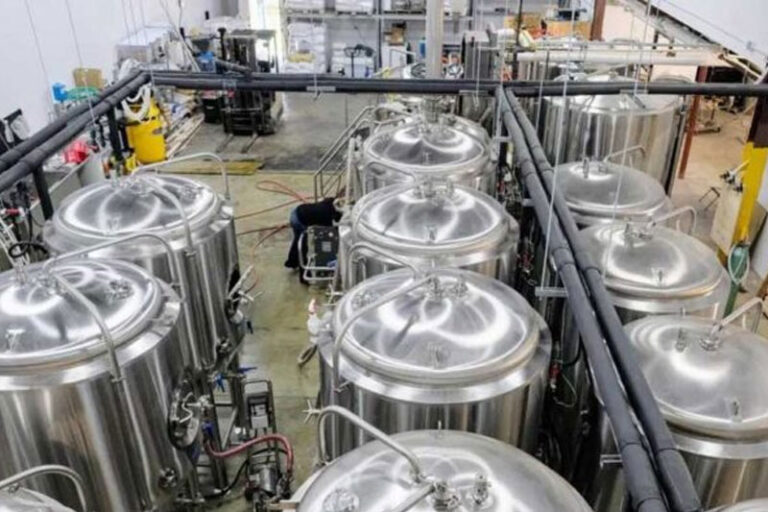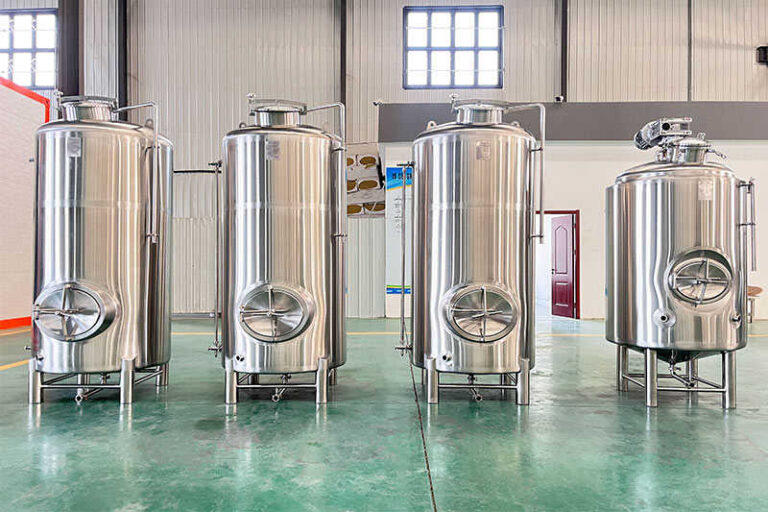Kombucha, a fermented, bubbly beverage based on tea and sugar, has become a popular choice for healthy drinks around the world in recent years. If you are an entrepreneur who wants to set up a large-scale kombucha operation, understanding kombucha brewing equipment is essential for successful brewing. This article will explain in detail the various types of equipment required for commercial kombucha brewing and the related brewing process.
What is commercial kombucha?
Commercial kombucha refers to kombucha drinks produced in an industrial, commercial environment. These kombuchas are usually produced, packaged, and sold on a large scale to meet the growing demand for healthy drinks in the market. Compared with home-brewed or small-scale kombucha, the production process of commercial kombucha is more standardized, and automated, and meets high standards of food safety and quality control.

Features of commercial kombucha
- Large-scale production: Commercial kombucha is usually produced using automated production lines to meet the large demand in the market. Every link in the production process is strictly monitored to ensure product consistency and safety.
- Standardized taste and quality: Compared with home-brewed kombucha, commercial kombucha has a more consistent taste, flavor, and quality. This is because standardized formulas and fermentation conditions are used in the commercial production process to ensure that the quality of each bottle of kombucha meets consumer expectations.
- Packaging and convenience: Commercial kombucha is usually sold in bottles, cans, etc., which is convenient for consumers to buy and carry. In addition, commercial kombucha may also have different flavor options, such as original flavor, lemon flavor, ginger flavor, berry flavor, etc., to meet the needs of different consumers.
- Healthy ingredients: Commercial kombucha retains the beneficial ingredients of traditional kombucha, such as probiotics, yeast, vitamins, amino acids, etc. These ingredients have certain benefits in promoting intestinal health, improving immunity, and helping digestion. Many brands will also add additional nutrients such as prebiotics, vitamin C, minerals, etc. according to market demand.
- Low-sugar or sugar-free options: With the trend of healthy eating, more and more commercial kombucha brands offer low-sugar or sugar-free versions to meet consumers’ demand for low-calorie and low-sugar drinks.
- Carbonated drinks: Due to the carbon dioxide generated during the fermentation process, commercial kombucha usually has a certain amount of bubbles, which brings a unique taste and refreshing feeling.
Commercial Kombucha Production Process
The production process of commercial kombucha is usually complicated, and a variety of equipment and technical means are required to ensure production efficiency and product quality. The following is a typical commercial kombucha production process:
- Raw material procurement and preparation: The main raw materials of commercial kombucha include tea, sugar, SCOBY (symbiotic culture), and water. All raw materials need to pass strict screening to ensure that they meet food safety standards and have stable quality.
- Tea brewing: The tea leaves are brewed into strong tea. The tea water needs to be soaked at high temperatures for some time to ensure that the taste and nutrients of the tea are fully released.
- Sugar water dissolution: Sugar is added to hot tea. The concentration of sugar is a crucial factor in the fermentation process. After the sugar water is dissolved, it will be cooled to room temperature.Add SCOBY for fermentation: Pour the cooled tea sugar water into the fermentation tank, and add SCOBY to start fermentation. At this time, the fermentation tank needs to maintain a certain temperature (usually between 24-30°C) and keep ventilation for yeast and bacteria to grow.
- Fermentation process: Fermentation usually lasts 7-14 days, during which parameters such as temperature, pH value, and gas content are regularly monitored. The goal of fermentation is to convert sugars into organic acids and gases while developing probiotics.
- Filtration and purification: After fermentation, kombucha needs to be filtered to remove residual yeast and other impurities to ensure that the product has a refreshing taste and clear appearance.
- Secondary fermentation and bubble generation: Some commercial kombucha brands will conduct secondary fermentation, and further fermentation after bottling will increase bubbles to enhance the freshness and uniqueness of the taste.
- Bottling and closure: The fermented kombucha will be filled, sealed, and labeled through an automated bottling line. After bottling, some kombucha may be pasteurized or stored in a cold chain to ensure the shelf life and safety of the product.
- Quality inspection and testing: The production of commercial kombucha will undergo a strict quality control procedure to ensure that each bottle of kombucha meets food safety standards and consumer expectations. These tests include flora testing, pH testing, dissolved oxygen testing, bubble content testing, etc.
- Distribution and sales: Finally, kombucha will be sold through multiple channels (such as supermarkets, health food stores, e-commerce platforms, etc.) to meet the needs of a wide range of consumers.

Commercial Kombucha Brewing Equipment
Stainless Steel Brewing Containers
Stainless steel brewing containers are the most common choice when brewing kombucha commercially. Compared with traditional glass or ceramic containers, stainless steel tanks have many unique advantages that make them ideal for commercial production:
- Strong durability: Stainless steel has strong corrosion and oxidation resistance, can resist the acidic substances produced during the fermentation process of kombucha, and will not be easily corroded like glass or plastic.
- Easy to clean and maintain: Stainless steel has a smooth surface and is not easy to accumulate impurities, which is very convenient to clean. This is especially important in commercial production, which can improve production efficiency and reduce product quality fluctuations due to hygiene issues.
- Large capacity: Commercial production requires a large amount of liquid. Stainless steel containers usually have a larger capacity for large-scale brewing, and common capacities range from hundreds of liters to thousands of liters. In this way, brewers can produce more kombucha more efficiently to meet market demand.
- Temperature control function: Some high-end stainless steel brewing containers are equipped with a built-in temperature control system that can accurately control the fermentation temperature, thereby providing the best temperature environment for the fermentation process of kombucha and ensuring consistent quality.
Automatic pH and Temperature Controllers
In the commercial brewing process, it is critical to ensure that the pH and temperature of the fermentation liquid are stable within the ideal range. The fermentation process of kombucha is affected by temperature and pH, and any slight fluctuations may lead to unsatisfactory fermentation results, which in turn affects the taste and quality of the final product.
- pH control: During the fermentation process of kombucha, as the sugars are converted, the pH value will gradually decrease and become more acidic. The automatic pH control system can monitor the pH value in real-time and automatically adjust it as needed to ensure that the acidity of each batch of kombucha meets the standard.
- Temperature control: Temperature has a direct impact on the activity of yeast and probiotics. Too high or too low temperatures will affect the speed and quality of fermentation. The automatic temperature control system can accurately adjust the temperature in the fermentation container and keep it in the optimal fermentation range (usually 24°C to 30°C), ensuring the normal growth of microorganisms and the smooth progress of the fermentation process.
- Data logging and monitoring: These systems also have data logging and real-time monitoring functions. Brewers can view the changing trends of temperature and pH at any time and make necessary adjustments to ensure the consistency and high quality of each batch of kombucha.
Barrel system
For those companies that sell kombucha in barrels, a barrel system is indispensable. The barrel system includes not only the container itself but also the carbonation system and the dispensing system:
- Barrel: A container used to store and transport kombucha. Commercial barrels are usually larger in capacity, with 10-liter, 20-liter or larger barrels being common. Barrels are usually made of food-grade stainless steel or high-density plastic to ensure durability, non-toxicity, and easy cleaning.
- Carbonation system: Kombucha naturally produces gas during fermentation, but in commercial production, in order to increase the bubble feeling and the refreshing taste of the drink, carbon dioxide is usually injected into the kombucha using a carbonation device. The carbonation system usually consists of a pressure vessel, a carbon dioxide cylinder, a regulator, and a bubble filter.
- Dispensing tap: Barreled kombucha usually needs to be bottled or poured directly from the barrel through a dispensing system during the sales process. The dispensing tap equipment can automatically control the flow of kombucha to ensure that the amount of drink poured each time is consistent while avoiding overflow or waste.

Commercial Bottling Line
- Automatic Filling Machine: Automated filling machines can accurately fill kombucha into bottles and ensure that the filling amount of each bottle of beverage is consistent. This equipment can achieve high-speed production and can fill thousands of bottles of kombucha in an hour.
- Bottle Sealing Machine: After filling, the bottle sealing machine will automatically seal the bottle mouth, usually by capping, screwing or pressing. The sealing machine can ensure that the kombucha in the bottle is not contaminated and maintain the freshness of the product.
- Labeling Machine: After bottling, the automatic labeling machine will label the bottle, usually including the product name, production date, shelf life, ingredient list, and other information. Modern labeling machines can complete this operation accurately and efficiently.
Filtration System
- Filter: The filtration system usually includes two stages: coarse filtration and fine filtration. First, coarse filtration removes larger particles, and then fine filtration removes tiny impurities such as yeast and tea residues. Common filter materials include activated carbon, polyester fiber, nylon mesh, etc.
- Centrifuge: Some high-end filtration systems also use centrifugal separation technology to separate tiny impurities from kombucha through high-speed rotation to achieve higher filtration accuracy. This not only removes particulate matter but also helps remove some tiny yeasts and microorganisms, thereby improving the clarity of the drink.
- Quality control after filtration: Filtered kombucha usually needs to be quality tested to ensure that it does not contain any undesirable ingredients or impurities and meets food safety standards.
How to choose a commercial kombucha brewing equipment supplier?
Supplier's industry experience and reputation
It is usually a wise choice to choose a supplier with many years of industry experience. Experienced suppliers understand all aspects of the kombucha brewing process and can provide tailor-made solutions to ensure the efficiency and adaptability of the equipment. By looking at the supplier’s customer cases, customer feedback, and market evaluation, you can get a preliminary understanding of the supplier’s quality and service level. Choosing a supplier with a good reputation and positive customer feedback can greatly reduce the risks in the equipment procurement and use process.
Quality of kombucha equipment
Kombucha brewing equipment needs to meet food hygiene standards, so the material is crucial. Stainless steel is usually the first choice for brewing equipment because it is not only durable and easy to clean, but also prevents rust and corrosion. In addition, the welding process, surface treatment, etc. inside the equipment also need to be carefully checked to avoid sanitary dead corners.
After-sales service and technical support
Most commercial brewing equipment requires professional installation and commissioning. The supplier should be able to provide a professional installation team to ensure that the equipment is put into use smoothly and is reasonably configured and commissioned according to process requirements. The technical support and employee training provided by the supplier are also key considerations when choosing a supplier. Equipment operators need professional training to ensure correct operation and timely troubleshooting of equipment failures. Suppliers should provide continuous technical support, including operation manuals, video tutorials, and remote guidance.
Budget
The initial purchase cost of the equipment is a factor that cannot be ignored. Reasonable budget arrangement is the key to selecting equipment suppliers. Suppliers should provide equipment in different price ranges to meet the needs of different companies. From a budget perspective, choose cost-effective equipment, not just the price of the equipment.

